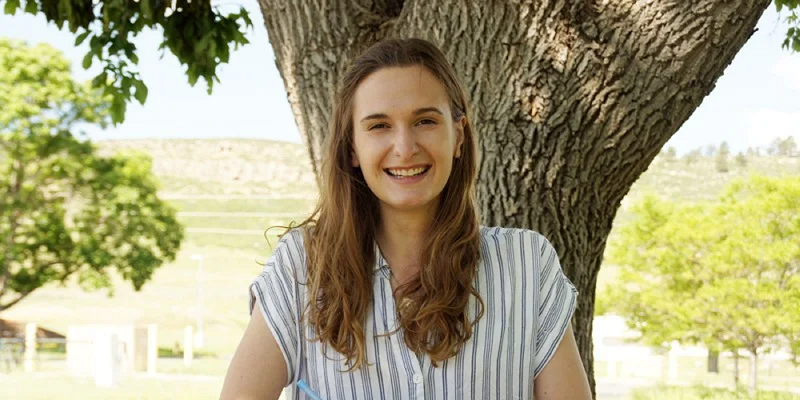Adeline Williams, a third-year Ph.D. student at Colorado State University, is co-guest editing a JoVE Methods collection on transgenic manipulation of arthropod vectors with her PI Ken Olson.
Ahead of the International Day of Women and Girls in Science (February 11th), we spoke to Adeline about how working in an insectary as an undergraduate eventually led her to a Ph.D., how a JoVE Methods Collection is boosting her networking skills, and the advice she has for the next generation of Ph.D. students.
How did you decide on the subject of your Ph.D. research?
My dad was a physicist, so I grew up talking about science, which initially influenced me to go into STEM. I always leaned more towards the life sciences, but I stumbled into vector biology just by chance. As an undergraduate at Tulane, I got a job working in an insectary doing the dirty work like picking pupa and cleaning containers. I really liked the job because I felt like I was doing “real world” research. This was in New Orleans, so we were surrounded by mosquitos; I could pull them out of the air and identify them.
I got excited about medical entomology because it is so interdisciplinary; it pulls from molecular biology, entomology, modeling, and many other fields. After my undergrad, I went on to do a Master of Public Health in infectious disease epidemiology at Yale. I worked on tsetse flies, and this was one of my first experiences with molecular entomology at the bench. At this point, I knew I wanted to do a Ph.D. on how vector biology influenced pathogen transmission, but I also knew I needed more experience at the bench. I decided to take a year off and work at the NIH in Dr. Carolina Barillas-Mury’s lab, where I studied how the malaria parasite interacts with Anopheles mosquitoes. My favorite part of this research was that I was studying the mosquito, where vector-borne transmission of parasites actually occurs, instead of using a model system.
While at NIH, I contacted Ken Olson at Colorado State University for my Ph.D. research because our interests overlapped. Now, I’m in my third year at Colorado State. I study mosquito antiviral immunity, how it impacts virus transmission, and how it can be genetically manipulated to prevent transmission. I’m still collaborating with the NIH, and it’s been really influential in my research to be mentored by so many different experts in the field.
What habits or organizational strategies do you use to keep projects on track?
I have always kept a journal to vent my daily grievances, and I keep a handwritten lab notebook as well. I think it is critical to have everything written down so I can always refer back to what I did, the protocols I developed, the results, etc.
I also keep summary slides of annotated gels and results that are straight to the point. I started these slides when I was working at the NIH before grad school so my supervisor didn’t have to try to read my handwriting after I left the lab — slides are more easily transferable. But I kept up the habit, and it turned out to be especially helpful in this era of electronic meetings. I don’t have to worry about preparing if I’m called into a last-minute meeting with my PI or our collaborators; the summary slides are always up to date.
How has building a JoVE Methods Collection helped you with career development?
I’ve been able to do tons of networking, which has been a great experience. I spent a whole day emailing people from around the world, and I got to hear about a lot of diverse research.
Reading all the abstracts for the collection has also really opened my perspective about different research techniques. Our collection is unique because it covers transgenic manipulation techniques for any arthropod vector — mosquitoes, sandflies, wasps, ticks, etc. I work on mosquitoes, and I rarely have time to read the literature on other arthropods. It’s easy to forget how much you can learn from different systems, so it’s nice to have a collection of articles on different arthropod/pathogen pairs.
I also learned a lot about working with journals and editors. I had never worked on a special collection before, and now I have a much better understanding of journals and editorial processes.
What advice would you give to someone who is just starting their Ph.D.?
There are many career pathways out there for people with a STEM Ph.D., and there is a misconception that you will only learn technical and bench skills. I’ve learned so much about how to think critically, analyze data, and communicate effectively. These skills will be useful for many career paths, so it is not a limiting decision to decide to get a Ph.D. That said, getting a Ph.D. is challenging and competitive, so you should have a gut feeling that this is the right choice for you.
My second piece of advice is don't take failure personally at the bench. When I first started, a failed experiment would ruin my entire night. I always assumed it was my fault, and I over-analyzed it. This is counterproductive. Experiments will fail, and you need to be adaptable. Refocus your efforts, make adaptations to the protocol, and you can figure out how to make it work.

